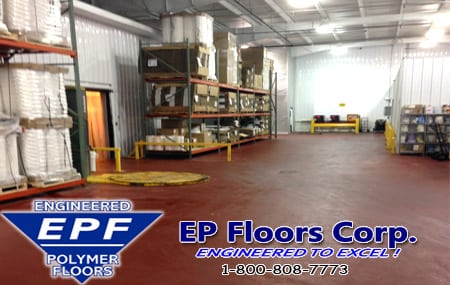USDA Approved Flooring Improves Efficiency at S. Chesterfield, Virginia Meat Processing Facility
USDA Approved Flooring Improves Efficiency at S. Chesterfield, Virginia Meat Processing Facility
From its plant in South Chesterfield, Va., Campofrio Food Group America supplies restaurants and retailers across the country with a full line of Italian and Spanish meats under the Fiorucci and Campofrio brands, respectively. Due to the recent growth of the $100M company, it has recently expanded its processing facility.

Chesterfield, VA (June 28,2016)– When $100M specialty meat processor Campofrio expanded operations at an existing processing plant, it wanted to ensure that the facility met the highest of safety, sanitary and work efficiency standards. To ensure this, Campofrio teamed up with expert installers and service providers for its top-of-the-line showcase facility. They tapped leading USDA approved flooring provider, EP Floors Corp.
EP Floors Corp, a licensed VA flooring contractor, is a specialist in food and beverage processing flooring, throughout the U.S. and abroad. They installed PUMA-CRETE ®, a proprietary blend of polyurethane resins and cementitious aggregate blend. It is a trowel-applied mortar, installed in one pass at ¼-3/8” thickness (6 to 9mm).
Puma-Crete® is designed to withstand harsh conditions in meat, poultry, and and other food processing facilities. Conditions include live steam, thermal shock during 180 deg. F washdown, chemical sanitizers, and grueling impact and abrasion conditions. Per USDA requirements, the flooring must be impervious to moisture and high performance, so they can be readily and thoroughly cleaned. Floors must be graded for complete runoff, with no standing water, and should not promote microbial growth.
EP Floors project manager Glenn Jobson noted that the Camprofrio project required thorough preparation and analysis to ensure that the urethane concrete floors met the unique requirements of this meat processor. “Camprofrio needed a strong design, because floor drains and perimeter edges are normally the weakest points in a flooring installation,” Jobson said. “We addressed this by keying in each drain and termination for the types of flooring. We cut out 1.5 inches wide by three-quarter inches deep around each drain to provide extra strength, integrity, and a seamless ‘locked-in’ fit.”
EP Floors’ Puma-Crete troweled flooring is twice as strong as concrete. Camprofrio’s new USDA approved floor is definitely one of the toughest floors in a meat processing plant today. In fact, this extra attention to detail and extra effort impressed local health inspectors that they have asked permission to bring other regulators and food processors to the new facility to see examples of best practices in food processing facility design and construction.
Foundation for Success
Camprofrio’s floors are among its most hardworking assets. Every day, their floors are subjected to heavy forklift and foot traffic, and loads weigh as much as 4,000 pounds each. Project supervisor Javier Unda with IDOM, the project design engineering firm and project manager, commented; “We’d say that flooring is one of the biggest concerns in a food processing plant,” he added. “It’s important to have a floor that’s durable, non-skid, sanitary and easy to maintain.”
The PUMA-CRETE® which EP Floors used for Camprofrio is ideal flooring for a busy plant like Camprofrio and for the food and beverage industry. It helps create a safer and healthier work environment by reducing slips and falls, and provides a surface that actively works to fight germs and bacteria. The cementitious urethane mortar flooring is also available with a seamless cove base, which can transitions to over concrete curbs
Right Flooring Choices
In selecting the right flooring solution for a food processing plant, Jobson suggests looking at all variables—budget, potential downtime, temperature, traffic loads and degree of slip resistance required—before making a final decision.
For instance, packaging areas with moderate traffic require a thin film coating system with good stain resistance. Regular wash down and process areas, on the other hand, require additional protection including thermal shock resistance, impact resistance, and chemical resistance.
“Of course, there is no substitute for an experienced team of flooring specialists who truly understand the demands of the business,” Jobson added. “In the case of Camprofrio, they are now experiencing the material gains of investing in quality food processing flooring, well planned architecture and design, and top notch building materials and vendors. They may soon add additional product lines to the facility, and they are confident that with a dependable partner like EP Floors, they can continue to grow and diversify while adhering to superior quality standards.”
In addition to Camprofrio, EP Floors’ roster of satisfied clients include industry leaders like Campbell’s Soup, Kroger Foods, Del Monte, Purdue, Cargill, Swift and Company, Hersheys, among other top names in food and beverage manufacturing.
For more information about E P Floors’ USDA approved flooring systems, visit the website at www.EPFloors.com.
About EP Floors Corp.
EP Floors Corp. is a vertically integrated flooring company, providing USDA approved flooring, polyurethane cement flooring throughout the United States. Specializing in Food & Beverage processing floors, E P Floors Corp provides the materials, installation with their own crews, and a solid five year warranty.
For more information, contact:
Sean Mitchell Phone: 1-800-808-7773 x114 E-mail: smitchell@EPFloors.com




